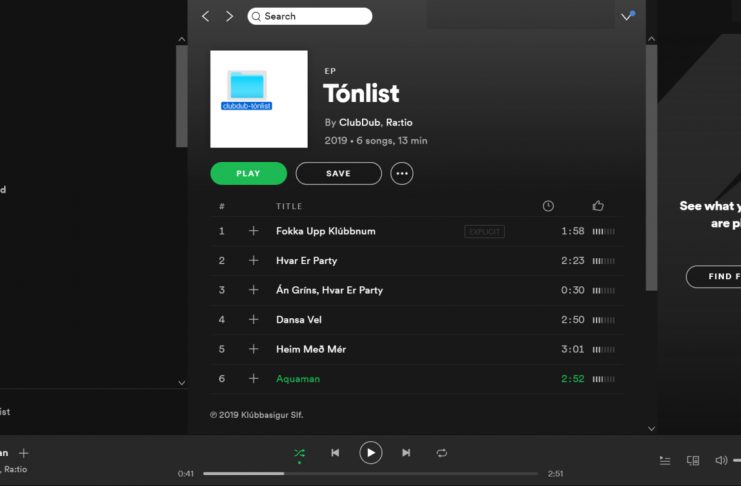SKE English
On May 29th, the Icelandic duo ClubDub released the EP album Tónlist (Music) in collaboration with the production team Ra:tio and Young Nazareth. As I write this, there are four ClubDub songs sitting among the top ten tracks of Spotify’s Iceland Top 50, which is, I suppose, how we measure success in music today.
I wouldn’t say that I’m the biggest fan of ClubDub. I would say, however, that I’m intrigued by the project—in a kind of anthropological way; listening to ClubDub, I feel not unlike an exile who, by some sorcery of sonic space travel, has been afforded a short-lived sojourn to his former homeland:
The club scene.
This is to say that I am old, really old (33 years old), and while I am permitted—granted the pitying grace of bouncers—to enter into establishments like Prikið or B5, or whatever other spots currently prevail among the Icelandic youth, I can no longer inhabit those places fully. I can visit only as a ghost; for, let’s face it, when it comes to the territorial boundaries of nightclubs—the only valid passport is youth. For everyone else, Prikið and B5 embody a reality that is the exact opposite of that infamous Hotel California lyric:
You can check IN any time you like /
But you can never really ENTER /
That being said, any lack of enthusiasm on my part for the music of ClubDub should probably be chalked up to middle-aged bitterness; how can one love a culture (youth culture) that has decreed one’s own banishment? How can one high-five the no-doubt charming members of ClubDub without suffering the embarrassment of their ruddy palms passing through the immaterial substance of one’s ghostly hand?
I am NOT the target audience here; I am merely the listener-equivalent to collateral damage.
As an exercise in middle-aged acrimony, I have taken it upon myself to write down my first impressions of the album Tónlist, thereby courageously exposing myself to ridicule from both sides of the generational aisle.
Here goes:
As part of the uninitiated, I reach for adjectives like „bass-heavy,“ „techno-ish,“ „house-ish,“ „club music,“ and the like, when listening to the album: words that may, in fact, be anathema to the duo’s own sensibility. The lyrics on Tónlist are often comical (whether intentionally or inadvertently, I’m not sure), evoking the feeling that one is eavesdropping on the inebriated inner monologue of a randy Icelandic adolescent, where random thoughts on boozing, boogying, and boinking flit through consciousness like small birds. Fokka Upp Klúbbnum („Fuck up the Club“) sounds like someone secretely taped a support group for alcoholic vandalists (is that the sample from Camp-Lo’s Luchini there in the beginning?).
„Hi, my name is Brynjar.
Hi, Brynjar.
And I love to fuck up the club.“
Hvar Er Party („Where’s the Party“) makes me think of a young Siddhartha Gautama being raised on Molly and Migos. (The title’s missing a question mark.) Dansa Vel („Dancing Well“) is, no doubt, my favorite track on the album: the funky bass line and the catchy chorus really do it for me, and the lyrics further support my theory that there’s this unworldly sincerity to the writing of young Icelandic musicians that is really quite endearing: „I’m dancing well; hope that they take notice.“ Heim með mér („Home with Me“) sounds like it belongs on the score of some as-yet-unreleased Lego Movie dealing with the fun side of addiction. And, finally, Aquaman feels like it was commissioned by a local kindergarten for the benefit of small children mastering the art of counting:
„I went to the pool today.
There were one, two, three, four, five,
Six, seven, eight, nine,
Girls in the pool.
I was alone.“
Admittedly, there’s a mystique to that last line: „He was alone? What did he do?“
„Boink them all?“
Words: RTH

